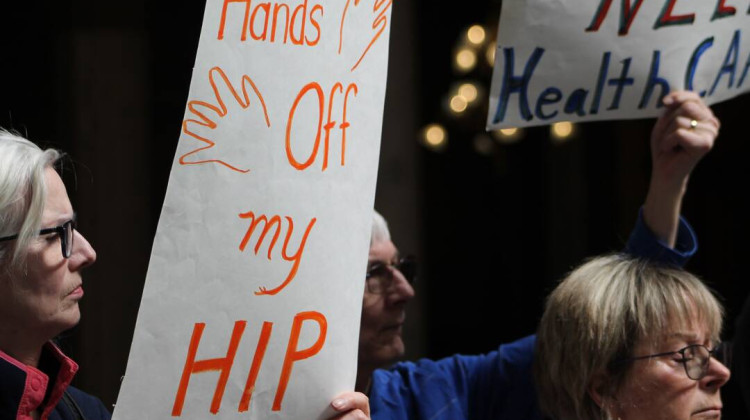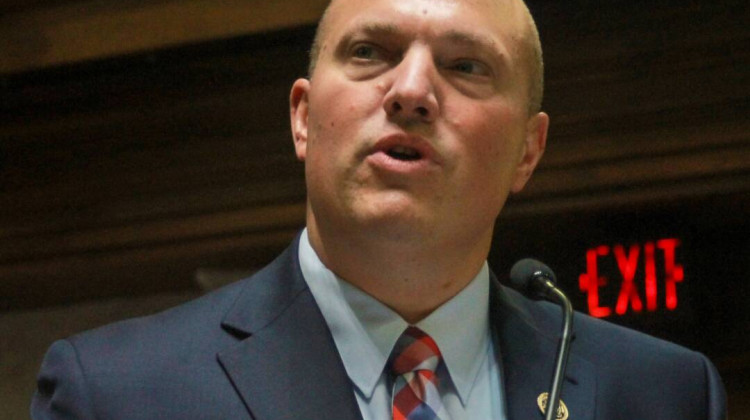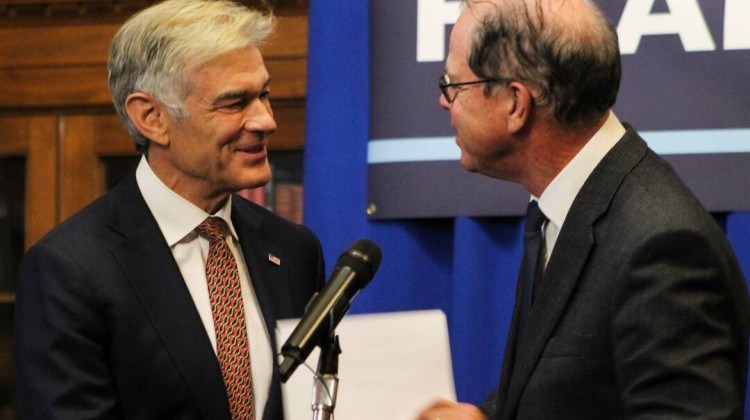The Indiana Department of Health reported 81 additional confirmed deaths over the last week. That brings the state’s total to 12,617 confirmed deaths. The state also reported more than 6,000 new cases in the last week.
Indiana has administered 1,602,873 initial vaccine doses, with 1,082,702 Hoosiers fully vaccinated.
Here are your statewide COVID-19 headlines from last week.
Indiana’s COVID-19 Restrictions To End April 6; Vaccines Open To All March 31
All Hoosiers age 16 and older can schedule COVID-19 vaccinations beginning March 31.
And as Gov. Eric Holcomb announced that expansion in a statewide address Tuesday, he also said he will end the state’s COVID-19 restrictions, beginning April 6.
Holcomb defended the vaccine eligibility plan the state has used up to now – its focus was to reduce hospitalizations and deaths by focusing on those most at risk: older Hoosiers and, eventually, those with comorbidities.
But after gradually moving down in age by five-year increments for weeks, Holcomb is ready to open appointments to everyone.
Indiana Officials Defend Decision To End All COVID-19 Restrictions
Indiana officials Wednesday defended the decision to end all statewide COVID-19 restrictions, weeks or months before all Hoosiers will get a chance to get vaccinated.
The governor announced all COVID-19 restrictions will be repealed April 6. But officials said vaccine wait times could be six weeks or more once eligibility is opened to all next week.
State Health Commissioner Dr. Kris Box said the science remains the same, whether the state has a mask mandate or a mask-wearing “advisory.”
Marion County Will Continue COVID Restrictions
Marion County will keep its COVID-19 mask mandate and capacity restrictions even after the state lifts its orders.
Gov. Eric Holcomb announced the state’s mask mandate would end April 6. He also said local governments may make their own decisions. This comes as Indianapolis hosts the NCAA Final Four and thousands of visitors flock to the city.
Indianapolis Mayor Joe Hogsett said Marion County has a much larger population and there is concern about an uptick.
“This month as everyone knows, we are hosting thousands of visitors from inside and outside our state,” Hogsett said.
Hogsett said the county will continue masks and capacity restrictions until data shows an end to the public health emergency.
Hoosiers Likely Face Longer Waits For COVID-19 Vaccine When Eligibility Opens To All
The governor announced all Hoosiers age 16 and older can schedule appointments beginning March 31.
But while the amount of vaccine doses Indiana will get in the next week is expected to increase by about 38 percent, there will be about 420 percent more Hoosiers eligible to get their shot.
State Health Commissioner Dr. Kris Box acknowledged the crunch that will create.
“Will our wait times, as far as will it take – rather than one week or two weeks or three weeks – maybe it would be six weeks?” Box said. “That is quite possible.”
READ MORE: How Will Indiana Distribute COVID-19 Vaccines? Here's What You Need To Know
Join the conversation and sign up for the Indiana Two-Way. Text "Indiana" to 73224. Your comments and questions in response to our weekly text help us find the answers you need on COVID-19 and other statewide issues.
Indiana Surpasses 1 Million Fully Vaccinated, Three Months Into State Rollout
More than 1 million Hoosiers are fully vaccinated against COVID-19, three months into the state’s rollout. The Indiana Department of Health announced the milestone Thursday.
According to data from the Centers for Disease Control and Prevention, that puts us right alongside our immediate neighbors.
The CDC’s data from March 24 reports 14.7 percent of all Hoosiers fully vaccinated. That compares to 14.4 percent in Kentucky, 14.5 percent in Ohio, 14.3 percent in Michigan and 14.5 percent in Illinois.
All IN: How Do You Hold March Madness In A Single City? And Is It Safe?
March Madness has come to Indianapolis, and it’s not just the Final Four. All IN finds out how tournament organizers are holding all 67 games of the tournament in one city, and whether it's possible to host a large-scale sporting event safely during a global pandemic.
All IN also talks to an epidemiologist about the public safety concerns some people have, and finds out how other sports organizations have handled hosting large events.
Indiana Delays State Tax Filing Deadline To May 17, Aligning With Federal
Hoosiers don’t have to file and pay their state income taxes until May 17 this year.
That’s after Gov. Eric Holcomb issued an executive order Monday, aligning the state’s deadline with the new federal tax deadline set by the Biden administration.
The U.S. Treasury Department announced last week Americans would have until mid-May, acknowledging the ongoing COVID-19 pandemic is still creating “unusual circumstances” for taxpayers.
Indiana Unemployment Rate Inches Downward In February
Indiana’s unemployment rate continues to inch downward according to preliminary federal data. The Bureau of Labor Statistics estimates the unemployment rate was 4 percent in February, down from 4.2 percent in January.
Indiana currently has one of the lowest rates in the Midwest, but there’s an important caveat: the number of people with jobs in the state actually shrunk slightly along with the number of people working or looking for work.
Unemployment Fraud Bill Clears General Assembly, Now Goes To Governor
Legislation to penalize fraud in the unemployment insurance system passed through the General Assembly and is on its way to Gov. Eric Holcomb. The Department of Workforce Development asked for the changes to go after people gaming the system.
If HB 1152 is signed into law, people who knowingly underreport wages or falsify facts on unemployment benefits applications will be required to repay it and could face civil penalties. Some advocates worry people who are confused when filing a claim could get caught in the crossfire.
Vigil At Statehouse Highlights Issues Exacerbated By COVID-19
Activists and faith leaders gathered at the Statehouse Tuesday for a vigil and call-to-action on the first anniversary of the state’s Stay-At-Home orders.
Tracey Hutchings-Goetz is the policy and communications director for Hoosier Action. She said the group collected a wide range of experiences – from unemployment to substance abuse to maternal health – to demonstrate the full brunt of COVID-19’s effect on Indiana.
"We have lost housing security, economic security, peace of mind – so much more than the 13,000 precious lives," Hutchings-Goetz said.
Hoosier Action also put together a report to highlight specific data trends and what lawmakers have – and have not – done to alleviate the virus’s impact on Hoosiers.
Report Examines Indiana Agriculture Supply Chain Issues During The Pandemic
Indiana food producers potentially lost more than an estimated $500 million during the pandemic. A report examines supply chain issues due to COVID-19 and how the state could prevent future losses in the industry.
An estimated 2,500 Hoosiers who work in agriculture tested positive for COVID-19 early in the pandemic, according to the report. Many were employees of meat processing plants.
A limited number of plants across the U.S. handle most meat processing. When some had to temporarily shut down or slow down production due to COVID-19 cases among workers, it caused a strain.
Contact Lauren at lchapman@wfyi.org or follow her on Twitter at @laurenechapman_.
 DONATE
DONATE







 Support WFYI. We can't do it without you.
Support WFYI. We can't do it without you.